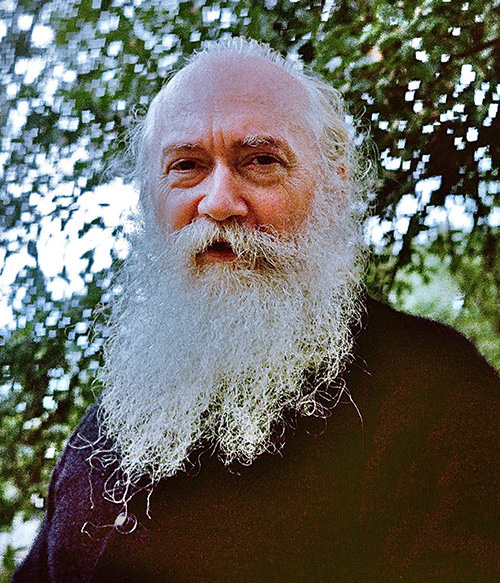 My guru, Shelly Trimmer,
was a very unusual, extraordinary, remarkable, and uncommon person. It is hard to describe him. For me, his
most endearing trait was his laughter. It is what I remember most about him. His belly laugh was the most
authentic and sincere laugh I ever heard. It emanated from deep within. He also had a kind of authenticity I
have rarely, if ever, observed. He was who he was. There were no pretentions, no masks, no showiness, no
airs about him. His eccentricity was not a showy kind of eccentricity; he was just genuinely different. He
didn’t have the need to prove himself to others. He knew who he was and was comfortable with who he was. I
never heard him say a mean or unkind word about anyone. Don’t get me wrong. He was a straight shooter, but
he was able to recognize people’s foibles without a hint of anger or resentment or unkindness.
My guru, Shelly Trimmer,
was a very unusual, extraordinary, remarkable, and uncommon person. It is hard to describe him. For me, his
most endearing trait was his laughter. It is what I remember most about him. His belly laugh was the most
authentic and sincere laugh I ever heard. It emanated from deep within. He also had a kind of authenticity I
have rarely, if ever, observed. He was who he was. There were no pretentions, no masks, no showiness, no
airs about him. His eccentricity was not a showy kind of eccentricity; he was just genuinely different. He
didn’t have the need to prove himself to others. He knew who he was and was comfortable with who he was. I
never heard him say a mean or unkind word about anyone. Don’t get me wrong. He was a straight shooter, but
he was able to recognize people’s foibles without a hint of anger or resentment or unkindness.
During the many hours I spent with him, he did most of the talking. His teachings were of two sorts:
1) I call his first method of teaching “informational.” It involved the passing on of ideas. Shelly presented vast amounts of esoteric data. He was a synthesizer who was knowledgeable in many fields: Kriya Yoga, Kabbalah, Astrology, The Bible, The Paranormal, Esoteric Physiology, Mathematics, and Pennsylvania-Dutch Magic. As a synthesizer, he had an ability to integrate those various viewpoints into his own unified system.
That made his teachings very complex, sophisticated, and often mysterious and difficult to understand. He was comfortable switching from talking about the chakras, the Law of Self-conscious awareness, the Law of Meditation, the Kabbalistic Sephirot, moving energy around the spine, stories about Yogananda, collecting hair from various people to do magic, unselfish love, and the peace that surpasses all understanding. He was able to do this while somehow organizing all those various parts to fit together in one coherent whole. I taped our sessions and listened and re-listened hoping to follow and comprehend. I made only a little progress. In my future blogs on this site, I will try to explain those teachings in a way that makes sense to me.
2) I call his second method of teaching “transmissional.” In Plato’s 7th letter, he contrasts the obtaining of mere information with the acquisition of wisdom. The subject matter of wisdom passes as a flame passes from a match to a stick. Plato says that what he teaches “does not admit of exposition like other branches of knowledge.” Plato goes on to say: “a light, as it were, is kindled in one soul by a flame that leaps to it from another, and thereafter sustains itself.” Shelly sparked a transmission that is impossible to put into words (“does not admit of exposition”). Sitting there, it felt like I was receiving darshan.
Perhaps I can give an analogy. There are a few songs which have perfectly good lyrics, but there is something about the voice and timbre of the singer that transmits far more than the lyrics. The example that works best for me is Total Eclipse of the Heart, by Bonnie Tyler. Her emotions come through in her singing. It is haunting and magical. Listening to it can put me in a different place or space, as though I have been temporarily transformed or transported. Barbra Streisand’s Avinu Malkeinu, Bob Dylan’s Like a Rolling Stone, Janis Joplin’s Down on Me and Whitney Houston’s I Will Always Love You can all do the same for me.
According to The Transformative Power of Music:
Sitting with Shelly had the same impact on me. It wasn’t just his intellectual, cerebral teachings that moved me. His presence and his being had an indescribable impact on me. To quote from the movie When Harry met Sally, being around him left me with the feeling “I’ll have what he’s having.” Unfortunately, soon after I left his presence, I came back to what he would call, using the Kabbalistic term, the world of Asiyah, which he pronounced “Asia.” In other words, I would return to ordinary consciousness.
In future posts, I will try to explain (as I understood them) Shelly’s teachings on The Four Worlds of the Kabbalah, The Chakras and Astrology, The Law of Self-Conscious Awareness, The Law of Meditation, and other ideas and philosophies.